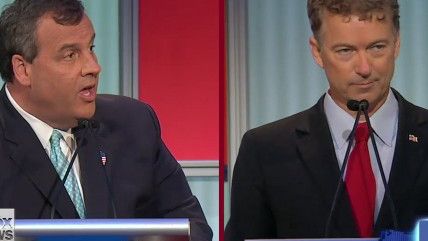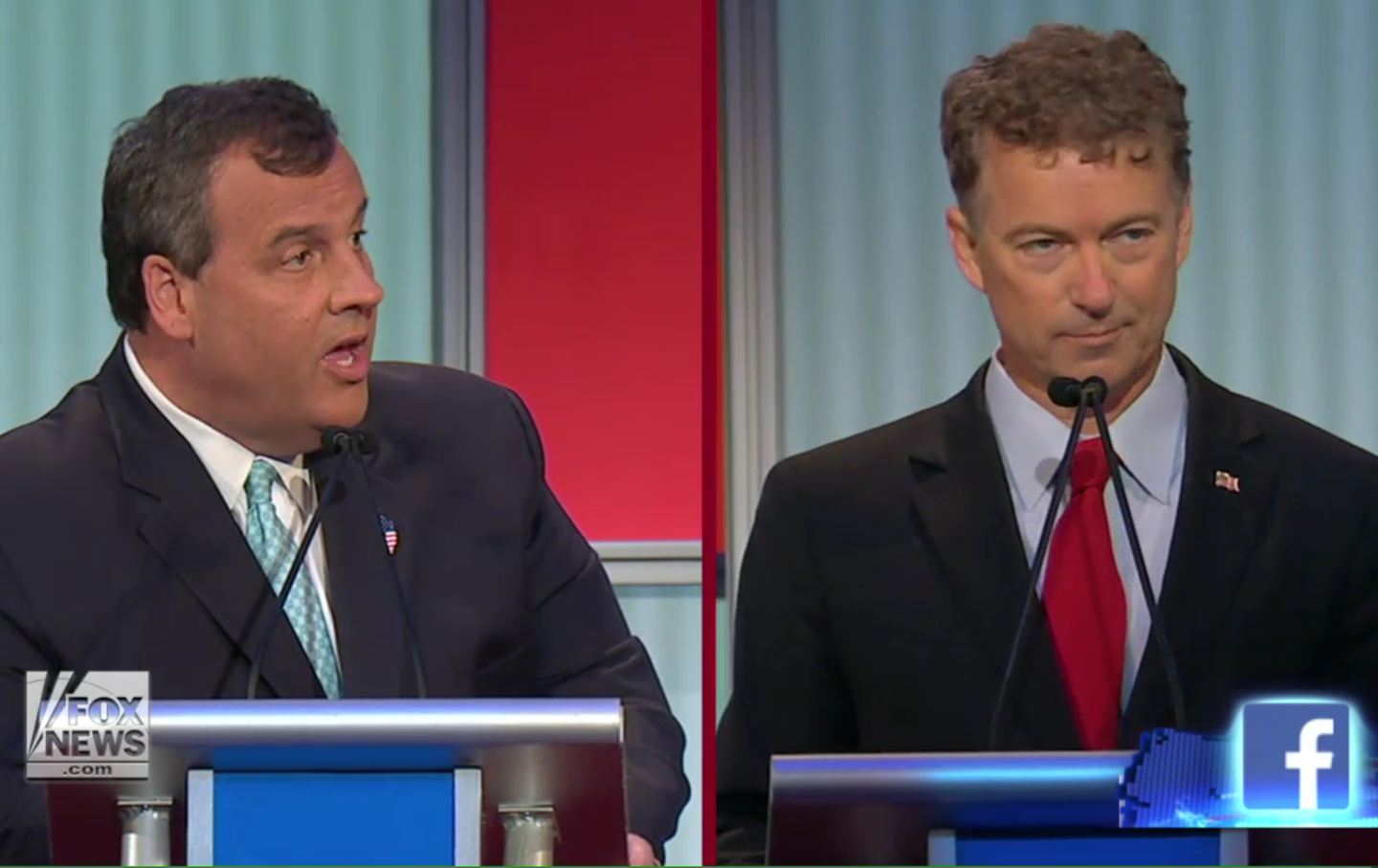Rand Paul Blasts Chris Christie's "Learning Problem"
The Kentucky senator says his GOP rival fails to understand, "You can use the Fourth Amendment and still get terrorists."

Sen. Rand Paul (R-Ky) took aim at one of his most vocal critics and a rival for the

GOP presidential nomination, New Jersey Gov. Chris Christie, at Yahoo's Digital Democracy conference on Thursday.
In an interview with Yahoo News' Oliver Knox, Paul blamed Christie's frequent misrepresentations of the senator's views on national security and government surveillance on a "learning problem."
Yahoo News' Hunter Walker quotes Paul as saying:
"Some will respond and say, 'Well what about terrorists? Does that mean you don't care about terrorists?' And I tried to explain this to the governor from New Jersey on the stage, but I think I'm having a little bit of a learning problem — learning curve," Paul said. "You can use the Fourth Amendment and still get terrorists."
Walker adds:
Paul also said he opposed the FBI's push to ban phone and email encryption and "without question" would allow Americans to obtain technology to protect their communications if he is elected president. He argued it is hard for people to trust that the government won't monitor them without obtaining proper warrants. Paul also suggested that creating a technological "backdoor" to facilitate government surveillance programs would make Americans' Internet activity vulnerable to our "enemies."
"The head of the FBI came out with this recently, he says, 'Oh, we're going to ban encryption.' And it's like we want to build a backdoor into Facebook and a backdoor into Apple products," Paul said. "A backdoor means that the government can look at your stuff, look at your information, your conversations. … The problem is, is that the moment you build an opening — and I'm not an expert on coding or anything, but the moment you give a vulnerability to a code that someone can get into your source code, not only can the government, but so can your enemies, so can foreign governments."
Paul's statements to Knox recall his dust-up with Christie over the Fourth Amendment and warrantless surveillance at the August 6th Republican presidential debate, where Christie fired an indirect shot at Paul, telling moderator Megyn Kelly, "I will make no apologies, ever, for protecting the lives and safety of the American people. We have to give more tools to our folks to be able to do that, not fewer, and then trust those people and oversee them to do it the right way."
To which Paul replied:
RAND PAUL: I want to collect more records from terrorists but less records from innocent Americans. The Fourth Amendment was what we fought the revolution over. John Adams said it was a spark that led to our war for independence. And I'm proud of standing for the Bill of Rights and I will continue to stand for the Bill of Rights.
CHRIS CHRISTIE: Megyn, that's a completely ridiculous answer. I want to collect more records from terrorists but less records from other people. How are you supposed to know, Megyn?
RAND PAUL: You get a warrant. Get a judge to sign a warrant.
CHRISTIE: When you're sitting in a subcommittee blowing hot air about that you can say things like that. When you're responsible for protecting the lives of the American people, then you need to make sure that you use --
RAND PAUL: Here's the problem, governor. You fundamentally misunderstood the Bill of Rights. I'm talking about searches without warrants.
In 2013, following the narrow defeat of a Justin Amash-sponsored amendment to a House defense appropriations bill that would have defunded the NSA's bulk collection of phone records, Christie lamented, "This strain of libertarianism that's going through both parties right now … I think is a very dangerous thought."
Writing at The Atlantic, Conor Friedersdorf takes issue with Christie's deterministic view that only allowing law enforcement to go to the dark side can ensure the safety of American citizens:
In fact, the phone dragnet has never stopped a single terrorist attack, during Chris Christie's tenure as a U.S. attorney or at any other time.
For that reason, advocates of the phone dragnet wouldn't be apologizing for protecting our lives and safety––they would be apologizing for abrogating our civil liberties with a surveillance program that didn't even make us any safer in the bargain.
More generally, the torture of prisoners, the invasion of Iraq, the worst abuses of J. Edgar Hoover, and all the illegal behavior uncovered by the Church Committee were carried out by a lot of people who had the intent of protecting the lives of Americans. That intent does not excuse imprudent or unlawful acts––and as a federal court has ruled, the provision of the Patriot Act that the NSA and the Obama Administration have used to justify the phone dragnet does not, in fact, even authorize it.
The "strain of libertarianism" which Christie calls "dangerous" is in fact a healthy skepiticism of the awesome and often unaccountable powers wielded by the federal government, which Paul also articulated at the Yahoo conference:
Paul argued that people have no reason to believe the government isn't monitoring their private communications because Director of National Intelligence James Clapper "lied" to Congress about surveillance.
"There is a huge trust gap. The head of our intelligence — the intelligence director James Clapper — came to the Senate, and when he was asked, "Are you collecting all of Americans' phone records?," he said no. He lied to us," Paul said, adding, "That's perjury. You can actually go to jail for what he did. He should have at the very least been fired, and he's still in that position."
In his March 2013 testimony before Congress, Clapper incorrectly said the government doesn't collect any type of data on millions of Americans. A few months later, former government contractor Edward Snowden leaked files that revealed that the National Security Agency had a bulk data collection program.
This past June, Paul spoke with Reason magazine Editor-in-Chief Matt Welch for a Reason TV interview that dealt touching on his opposition the Patriot Act, the military hawks of his own party, and his thoughts on Edward Snowden. Watch below:


Show Comments (31)